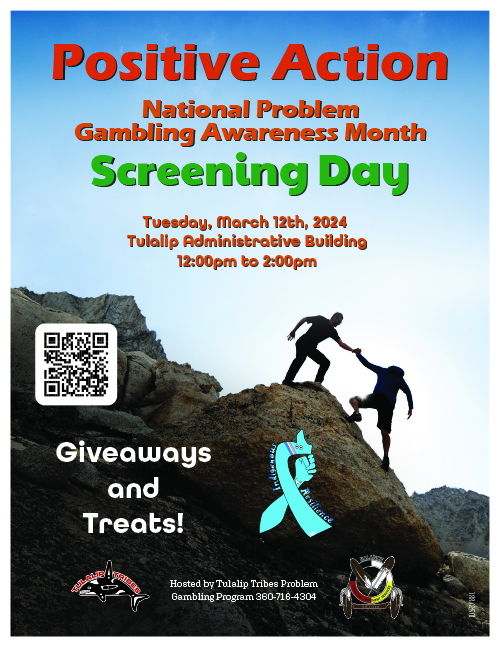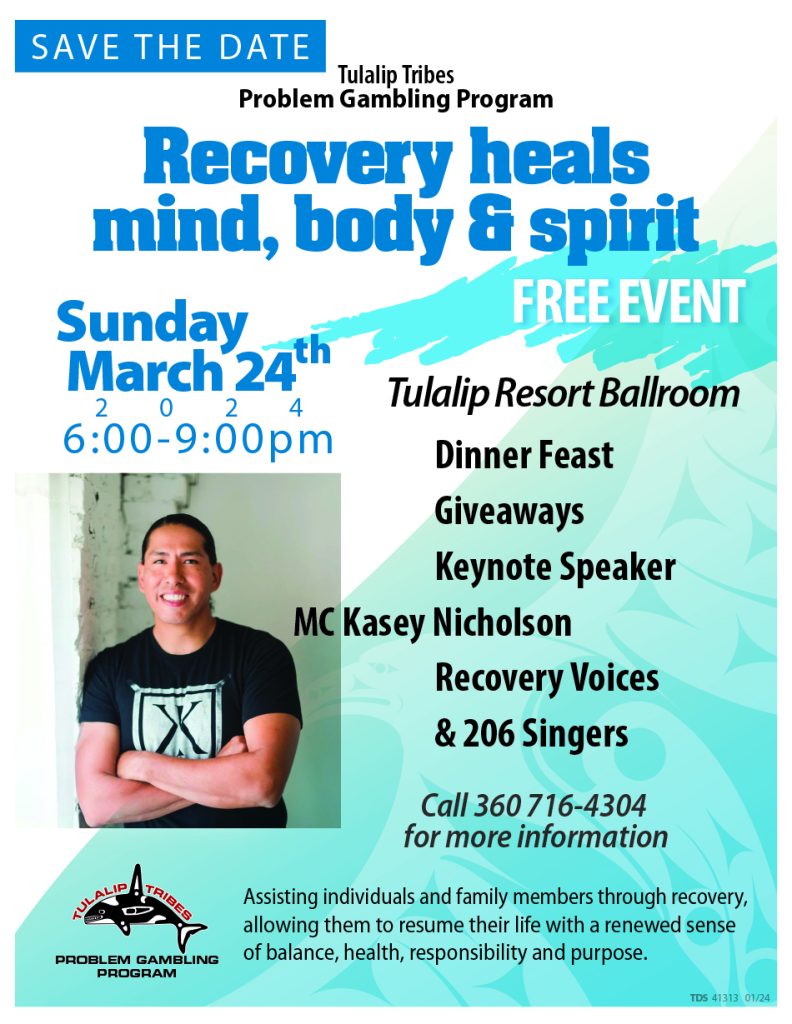
By Kalvin Valdillez, Tulalip News
“For a lot of people, gambling is the grand escape because they aren’t doing anything illegal, they are not using external chemicals,” explained Tulalip Problem Gambling Coordinator, Sarah Sense Wilson. “But it’s a process addiction that causes brain chemistry changes and floods your brain with dopamine – and it’s hard to have rational judgment because you’re under the influence of your own brain chemistry.”
For the past decade, the Tulalip Problem Gambling program has actively participated in a nationwide initiative known as National Problem Gambling Awareness month. Occurring every March, the Problem Gambling Program helps bring attention to the compulsive gambling disease by hosting fun, engaging, informative, and impactful gatherings during the awareness month.
Originally, the campaign began nearly twenty years ago in response to the rise of sports betting surrounding the NCAA March Madness college basketball tournament. An estimated two million US citizens meet the criteria for severe gambling addiction any given year, according to the National Council on Problem Gambling. And though that is roughly just one percent of the entire country’s population, there are hundreds of families affected by problem gambling, and the myriad of issues brought on by the disease, every year.
The dangerous and often silent habit affects the Native American community at a much higher rate than other ethnicities. A 2019 study by the National Institute on Alcohol and Related Conditions showed that 2.3% of the Indigenous population in America are battling a gambling addiction. That statistic is expected to be on the rise following the pandemic, however, that is the most current and up-to-date study available on this topic.
Said Sarah, “Gambling may not be their primary addiction, it can be tied in with other diseases – grief, loss, trauma – and that barely scratches the surface. We’re focused on putting information out in the community; we’re doing presentations, we’re doing outreach and community education as much as we can. I think it’s especially important in Indian Country that we shine a spotlight on Problem Gambling Awareness month, given that a lot of our tribal communities have high risk factors and vulnerabilities. The more that we’re informed, the more we can make good decisions for ourselves.”
Indian Boarding School Survivor, Matthew Warbonnet, took time to speak about how the Tulalip Problem Gambling program has helped him navigate his trauma resulting from the years he endured at the St. Francis Indian School in South Dakota – a Catholic institution where students were subjected to a multitude of mental and physical abuses throughout their duration at the school.
He shared, “There were times when kids were literally beaten to the floor. Corporal punishment was the call of the day you might say. I think a lot of our history attributes to addiction, whatever that addiction might be, and I think that if there were more programs like this, that would help our people. Even if only five people went to those programs, you’re looking at affecting that entire family in a good way, and it’s a ripple effect.”
Matthew continued, “We all have issues from the past that bother us. And the (boarding school experiences) were haunting me and I couldn’t run from it. It got to the point where I no longer wanted to be here, and I was ready to move on. I contemplated suicide on several occasions – and I started in with self-destructive behavior. One day I kind of realized what I was doing. So, when I heard about this program, I came down. And I want to say that I really appreciate the Tulalip Tribes for having this program because it’s been tremendous for me. Just being here and being able to identify what those issues are. I came to understand that I should not reject any offering of help – I appreciate this program more than I can ever say.”
The Tulalip Problem Gambling program is a national model program that many Indigenous tribes look to when designing and operating their own programs. They are also a part of a northwest intertribal problem gambling coalition, with the Swinomish, Lummi, Stillaguamish, Port Gamble, Suquamish, Puyallup, Muckleshoot, and Nisqually tribes, that meets regularly to discuss what is and what isn’t working for their programs. They also share ideas on how to educate their communities and provide prevention and treatment to those in need of assistance.
The Tulalip Problem Gambling program has helped aid those in recovery over the years by developing a personalized plan with each person who walks through their doors. Since its establishment, the Problem Gambling program has served not only members of the Tulalip tribal community, but non-Natives as well who are also fighting a gambling addiction and live in our neighboring communities of Everett, Marysville, Arlington, and Stanwood.
A local woman, who wishes to remain anonymous, opened up about her personal recovery journey with the Problem Gambling program. She stated, “I was pretty much a daily gambler for about 15 years. I ended up getting fired from my job because of my gambling issues. My rock bottom was losing my job and when that happened is when I finally realized what I was doing. Those two weeks after I lost my job – that was probably the worst experience of my life. I wasn’t sleeping, I wasn’t eating, I was in physical pain all day long. I went through a couple of weeks of just really an all-consuming guilt and shame, and it was horrific.
“And then I thought, you know what, I just need to find a GA meeting. So, I went online and found a GA meeting and attended my first meeting in Everett where I met this guy who told me about the Problem Gambling Program that Sarah runs. The next week I went and had an assessment, and the rest is history. I have just over 10 months of sobriety and will reach my first year in April.”
Both Matthew and our anonymous speaker praised the Problem Gambling program for identifying the root of their addiction and for creating a space where gambling addicts can gather to support each other while on the road to recovery. And similarly, when asked to share some words of advice and encouragement for others who are currently caught in the cycle of compulsive gambling, they both wanted to share that recovery from this disease is possible with the help of the program, and also to extend an invite to anybody battling their addiction.

This National Problem Gambling Awareness month, the Problem Gambling program will be hosting two major events to help bring attention to this issue that is plaguing many people throughout the reservation and region. The first event is the Positive Action Screening Day which will take place Tuesday, March 12 at the Tulalip Admin building from 12:00 p.m. to 2:00 p.m.
Shared Sarah, “The screening day is another national campaign and it’s a non-invasive way for people to do a quick screen, for people to self-determine where they’re at with their relationship to gambling – is it healthy, is it not healthy, could it be better? It’s four questions and only three of them are related to gambling. We’ll be providing information cards and we’ll be giving out cookies, popcorn, cupcakes, and mini smudge kits in exchange for them to complete that four-question survey.”

The next event will be held on Sunday, March 24, 6:00 p.m. to 9:00 p.m. at the Tulalip Resort Casino. This is the popular and much anticipated dinner celebration that is held on an annual basis and offers the promise of good food, good entertainment, and eye-opening testimonies from local gambling addicts in recovery.
“The dinner is held to raise awareness and provide a space for education about the addiction and about prevention but it’s also to celebrate those in recovery,” said Sarah. “We want to lift them up and have them be in a space where they’re cared for, celebrated, cheered-on, and honored for their work – and also for their contributions to the recovery community. Every person in recovery is contributing to the wellness to the whole, and that’s powerful.
“We’ll have a variety of entertainment; our 206 drummers, everyone loves them being there, they rock the house and bring that energy. Natosha Gobin is going to do the opening blessing and she’s going to share a traditional story that relates to addiction. Then we will have a GA speaker who will share their story, their inspiration. And our Master of Ceremony is Kasey Nicholson, he is a comedian and was also the keynote a few years ago. It’s free, it’s open to everybody, and everyone is invited!”
We hope you show your support during this year’s Problem Gambling Awareness Month. If you or someone you love is dealing with a gambling addiction, or if you would like to find out more information about the Problem Gambling program, please contact (360) 716-4304.